(Image via South Park Studios)
DISCLAIMER: I’m sorry if you’ve arrived here on the click bait title assuming this is another moronic SEO IS DEAD post, armed to the teeth with seething logic and facts ready to spew all over the comments section and call this article out as BS. Rest assured, I am a fellow SEO and I am far from believing the days of SEO are numbered. I do however have some very strong views on voice search and how that may impact both our work and the results we can achieve for our clients/businesses. Please do read on with the above in mind before tearing me apart. Cheers!
Last month, I did my first ever industry talk at Manyminds’ Give It A go Conference. It was a lot of fun and I met some great people.
Two of the talks at the event, respectively by Luke Monaghan of Koozai and Tom Pratt of Manyminds, spoke about voice search. At the end of Tom’s talk, I asked a question that in all honesty, I don’t think anyone in the room truly had the answer to (myself included), and it’s been bugging me ever since. The question was along the lines of…
“With voice search using rich snippet data for query or longtail based searches, do you feel it optimising for such phrases could be futile in some regards to the fact screen-less devices such as Amazon Alexa and Google Home are not sending you traffic and are essentially stealing your website’s content to deliver information to the user in audio form?”
To expand on the logic behind this question, I’ll point out my two main reasons why I feel these longtail searches would have a negative impact on your site…
- How do you get your brand image over in a voice search result if the user can’t see your logo/site?
- How do you promote calls to action or encourage users to view more content/subscribe if the user isn’t on your site?
It’s all well and good being the snippet on search results for longtail queries and don’t get me wrong, they will likely still bring you traffic from desktop and mobile users. But as voice search and the popularity of screen-less devices grow, that’s potentially one less place you’ll be getting traffic from your content efforts and one more weapon in the arsenal of search engines stealing a piece of the pie to benefit themselves.
Rich snippets and the content theft debate is nothing new
I still believe to this date Dan Barker’s most engaged with tweet is when he jokingly pointed out to Matt Cutts that Google was a scraping site…
.@mattcutts I think I have spotted one, Matt. Note the similarities in the content text: pic.twitter.com/uHux3rK57f
— dan barker (@danbarker) February 27, 2014
There’s been an ethical debate around Google results and displaying content from other websites within search results ever since rich snippets and knowledge graph first became a thing. A recent study by Ahrefs found that when a rich snippet is present on a SERP both the rich snippet result and the top organic result get a lower CTR than what they would have ranking #1 on a result without a rich snippet. I also recall an article published earlier this year about how celebritynetworth.com lost 65% of its traffic after data from the website started to feature in rich snippets.
Hell, I even highlighted this as a side point in one of my slides in my Manyminds talk using an example of the SERP for “cheap flights”. It’s a keyword that has less value for websites in the flights niche now Google has its own flight comparison tool appearing at the top of the results.
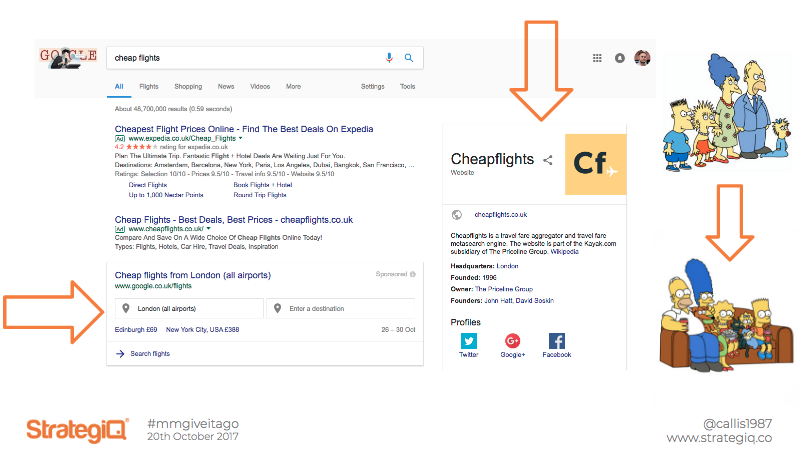
Granted I also believe that many SEOs, particularly those operating before 2012, are not really in a place to lecture Google about organic results and ethics, but that’s a different debate for a different day. For now I just want to touch on the search engine’s side of things.
Delivering results to benefit the user
I remain in two minds about rich snippets; the part of me that identifies as a user and the part of me that identifies as a marketer.
The user side of me loves rich snippets because they make my life easier. I recently decided, with all my dirty-lefty-vegan-do-gooder heart, to give Ecosia a spin and set it as my default search on Chrome. For those who don’t know Ecosia, it’s a search engine powered by Bing results that puts 80% of its surplus income towards planting trees.
But, as much as I liked the idea of every search I made helping the environment, the results I was getting simply weren’t as good. I found myself often following up searches in Ecosia with a search in Google to find what I wanted. An example of this can be found below when comparing the results for “nearest bakery” in both search engines side-by-side.
Ecosia:
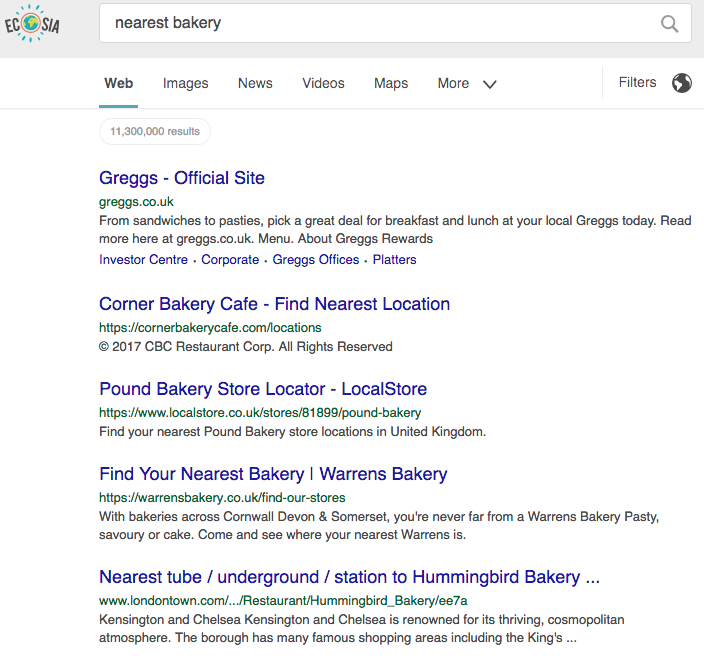
Google:
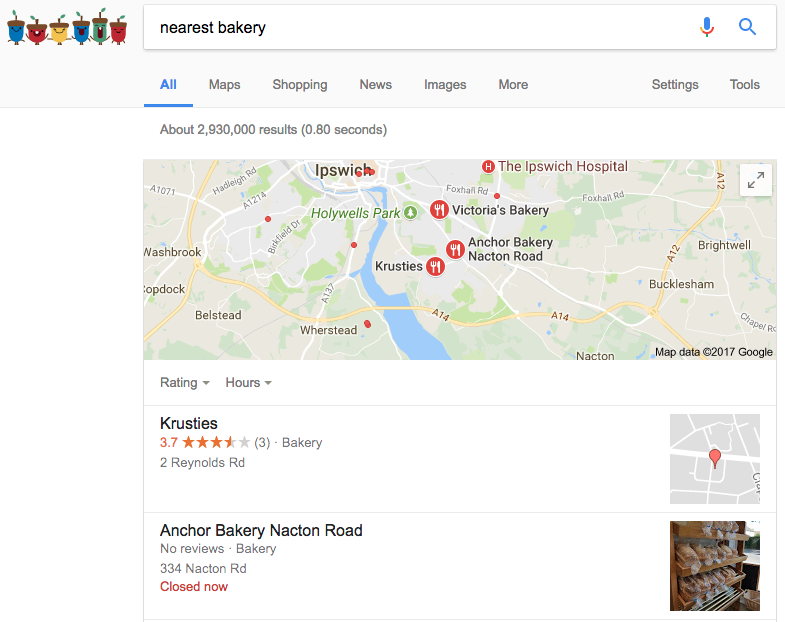
Even when ignoring the irrelevant sites Ecosia returns (Nearest tube station in Ipswich!? Really!?), it’s pretty clear from a single glance which SERP is the most useful. HINT – It’s the one that gives me a map, addresses, names, opening times and reviews of bakeries near my location. It has all the information I need to know on a single screen and saves me time/effort clicking around on another website. This is just a single example of how I, as a user, love rich snippets.
(Oh, and FYI, Anchor Bakery kicks ass).
However, as a marketer, there is a the side of me that hates rich snippets. Anyone who works in SEO, particularly on results involving local or informational intent, is well aware that these nuggets of information can steal traffic. If the user gets the answer to the question they are looking for in the search result, that’s traffic lost to your website where you would have presented the user your brand and potentially gained a lead/sale from your on page CRO efforts somewhere down the line.
Bite the hand that feeds
When I first joined the SEO rat race in 2011, I was still very much green when the first sweep of the Penguin update arrived and killed many sites over night. I saw countless business owners and/or webmasters declare how unfair it was on them that Google had stolen a portion of their web traffic. I watched once-confident SEOs, who could deliver the moon on a stick, flap around trying to convince their clients to stay and put their fingers in the air as to what the hell was going on. Whilst I can sympathise with these people, I remember thinking at the time how short sighted it was of anyone running a legitimate business to be relying so heavily on a single third party source of income.
Without getting into a lengthy side-tracked point about whether many of the sites that benefitted from a much-easier-to-game system deserved to rank in the first place, it all comes down to the simple fact that if you want to play in someone else’s game, you’ve got to play by their rules.
Think of it as when you played a game in the playground at school. You’d usually start lunch by debating which game you should play. It? Bulldog? Mister Wolf? The winning suggestion would be the one the other kids agreed they all wanted to play, and the kid who suggested it would declare it was “their game”, therefore they decided the rules. Another kid wants to join in? You need to ask Timmy because it’s his game. A debate breaks out between two kids over whether or not someone was in the home area when they were tagged? You best get Sally to make the call because it’s her game.
But where this line blurs for me is when Google starts stealing someone else’s information to present as their own in search results. That content likely came from a website or an author who worked hard to gather, fact check and present said information online.
Back to the school playground analogy, but I also remember if Timmy or Sally got too big for their boots and started throwing their weight around to the detriment of fairness and the enjoyability of the game, the other kids would splinter off and make a new game.
This is where I feel we are with search right now. Google, once a fairer and more sympathetic rule maker aiming to please as many kids in the playground as possible, now wants to ensure it helps one set of kids win (the users) regardless of what the other set of kids (the websites producing content) do in the game.

The issue is this Google kid is the toughest and most popular in the playground so the other kids have no choice but go along with it. Your options are play the game Google’s way and be included despite not having as much fun, or sit in the corner on your own crying.
Okay, so what does this have to do with voice search?
To demonstrate and try to understand the impact voice search will have via screen-less devices, I decided to run some tests. My understanding of Google Home for the most part is it pulls in answers via rich snippets, and to its credit it did cite the website source.
Unfortunately I do not own a screen-less device because their capabilities at present offer little use to me. Instead I called in a favour from my colleague Chris Green, who brought his Google Home into work for me to play around with and run some tests.
If you want to hear my annoying voice and insults aimed at an inanimate piece of technology, I’ve provided a video of the test below. But for those more sane, you can read the results of each test below said video.
When is the best time to go to London?
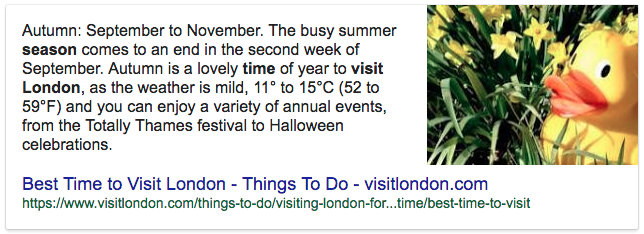
For this question, Google Home answered with the text from the above rich snippet, and cited visitlondon.com as the source.
How do you know if tofu has gone bad?

For this question, Google Home did not answer with the text from the rich snippet but information from a page ranking in position 3 for the search.

It did however again cite doesitgobad.com as the source.
What do Blue Tits eat?
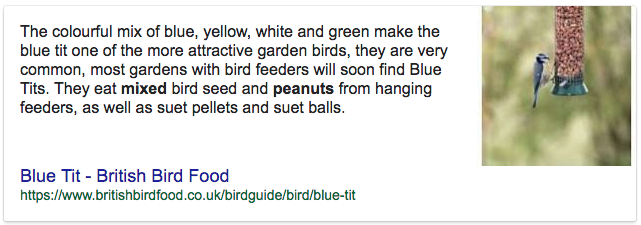
For this question, Google Home answered with the text from the above rich snippet, and cited britishbirdfood.co.uk as the source.
Who won the FA Cup in 1978?

For this question, Google Home answered correctly, but did not cite any source.
When I clicked the “Roster and Overview” expansion link underneath the rich snippet, the opening line was a short overview of who ITFC are alongside a link to the ITFC Wikipedia page, which makes me guess Google used data from Wikipedia.
I decided to follow this question up, playing on Google Home’s conversational-style and ask it what else ITFC have won. I was expecting it to at least mention our (old) Division One champions season in 1962 and our UEFA Cup win in 1981, but instead it just reminded me Ipswich had lost 2-0 to Middlesborough the previous weekend. Cheers for that mate.
I won’t dwell too much on this however as I would assume this was down to Google not understanding the context of the question. This theory can be furthered by googling “Ipswich major honours” where a rich snippet can be found listing all of the clubs achievements.
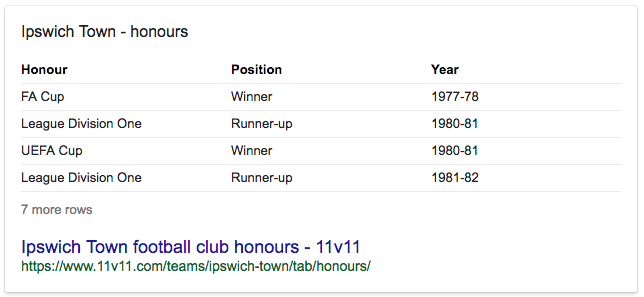
May it also be said it doesn’t show any rich snippet on the “Norwich major honours” SERP. Even Google knows who is the pride of East Anglia 😉
But Football banter aside, I concluded I hadn’t asked it the right question here.
What is the name of Stone Cold Steve Austin’s finishing move?

For this question, Google Home did not answer with the text from the rich snippet but information from a page ranking in position 6 for the search.

It did however again cite imdb.com as the source.
When is World Vegan Day?

For this question, Google Home answered correctly, but did not cite any source. There is nothing in the rich snippet that tells me where Google got this data or how it is storing it. I can’t find any information on this online at present either, so if you know please do leave a comment!
What is Cotton Eyed Joe about?
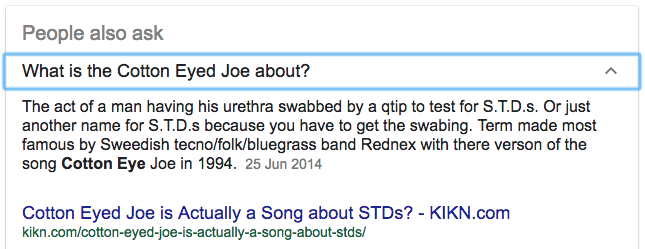
For this search, Google Home simply responded “There’s so much to know about Cotton Eyed Joe” and nothing else. No information, let alone from the rich snippet, was provided.
Again, perhaps we can but this down to a fairly new and ever-learning technology.
Which American party is like Labour?

For this question, Google Home answered with the text from the above rich snippet, and cited rogerdarlington.me.uk as the source.
When will the sun explode?
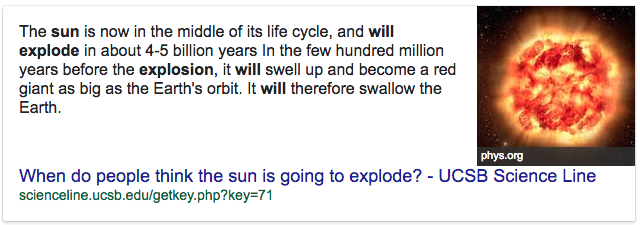
For this question, Google Home did not understand my wording of the original question, despite showing a snippet. I then refined the question to “Will the sun ever explode?” and it was able to answer. Again, let’s put this down to the technology.
However it did use the above rich snippet to answer the second time around while also citing scienceline.ucsb.edu as the source.
What do these tests mean?
I feel these tests reveal that Google Home is at least being polite enough to tell a user on a screen-less device where it gathered its data from, so I can’t fault Google in that regard.
The problem for me as a marketer however still sits with the fact a new technology is providing a platform that stops me getting clicks to client’s websites. As I flagged in the introduction to this post, it means less brand awareness and less calls to action present in front of the eyes of users who land on a site via longtail search queries.
You could argue Google Home telling the user the name of your site is brand awareness, but if I had of asked these questions without the rich snippet data in mind I certainly wouldn’t have paid attention to the source, let alone remembered it later down the line.
What’s the solution?
Is the fact sites are losing clicks via screen-less devices the fault of Google? I can’t say it is personally. Google is just going along with a new tech trend and I don’t believe it’s a debatably purposeful way to annoy SEOs in the same way rich snippets have stolen search traffic in the past.
I do however believe Google could be doing a lot more than just citing the source of information to help businesses and marketers. I’ve listed a few of these thoughts below.
“Would you like me to bookmark this article for you?”
Whilst citing the source is nice, Google could do the website source a solid favour by offering to bookmark these websites after reading out the information. This would also be helpful for users who may want to read more about the question they’ve asked. These could end up being sent to the user as a bookmark folder in Chrome, a notification on an Android phone or an email digest when they are next using a device with a screen.
Use it as a personalisation signal in the algorithm
When a user first sets up Google Home it asks if they want to use personalisation connected with their Google account. If a user is regularly being served useful content by a site, that site could get ranking benefits when that user does a search on a device with a screen where relevant.
Although I’ve not dived massively deep into testing the personalisation factor for this post, Chris had a theory that he was being served the BBC result from Google Home for an American pancake recipe he makes most weekends over the snippet Google gives from allrecipes.co.uk because of personalisation.
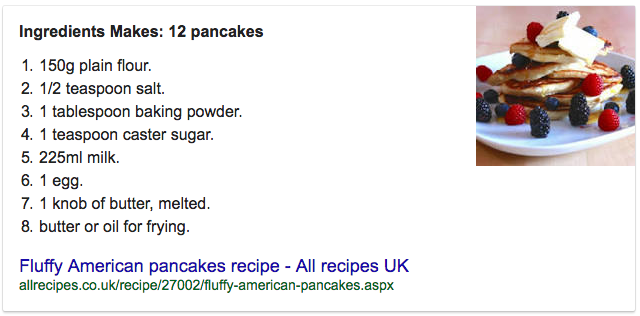
I took to Twitter and Facebook and requested anyone with Google Home to ask it “Read me a recipe for American pancakes” and of the 5-6 responses I got was a mixed bag between BBC Good Food and All Recipes. The issue I have here is I can’t account for a lot of factors in this test, such as location and even more personalisation, so nothing is conclusive.
Another test we ran was to ask Google Home for the contact details for Majestic, based on the theory that it would be more likely to return the information for the SEO backlink tool Majestic as opposed to the wine merchant Majestic. This test didn’t prove anything however, and still provided the information of the wine merchants.
Give us the data, damnit
Another thing Google could do is give us better data on voice search interactions. It’s been rumoured as early as March 2017 that Google is looking to bring a voice search filter into Search Console. That’s nice and everything, but I want more. I want to be able to see voice search as a device in Google Analytics. I want to be able to use cookies and user information to identify return visits from voice searches. And most importantly, I want to know what actual benefits screen-less devices are providing to my clients.
What does the future hold?
With 15 million Amazon Echos and 5 million Google Homes sold as of September 2017, and Apple’s Homepod release on the horizon, I don’t think this market is going to go away any time soon. According to a study in August 2017…
Roughly 65 percent of people who own an Amazon Echo or Google Home can’t imagine to going back to the days before they had a smart speaker, and 42 percent of that group say the voice-activated devices have quickly become “essential” to their lives.
Personally, for me and my lifestyle, home assistants are just gimmicks. I can see the practical use of having one if you live in a smart home with your lighting/heating/media centralised to a computer, but I’m a pretentious prick and still listen to vinyl. If I ever need to do a voice search, it’ll usually be shouting at my phone because I’m driving and need directions, or my phone is the other side of the room and I can’t be bothered to move.
Granted, for now, only 7% of adults (US) actually have a voice assistant in their home. I doubt these users are the biggest market for most businesses at present. However that still doesn’t take away from the fact that those 7% of users may have ended up in the conversion funnel and later purchased had they been using a device with a screen and visited your website.
Is optimising for longtail voice search worth it? Overall yes, but it would be nice if we still had that click. For now, when it comes to screen-less home assistants being thrown into this mix, consider this your new search marketing funnel for your content strategy…
Special shout outs to Matt at Prove, Jack at Andertons Music, Ross at Blonc, Tom Cox and Smiffy for getting back to me online with my odd Google Home pancakes request!
UPDATE 29/01/2018 – A blog post from Paul C (or @carpseo as I better know him on Twitter) touches on the same subject as this post and comes to similar conclusions. You can read said post and his opinions on how voice search will impact SEO here. I particularly enjoyed the following quote…
Facts are facts, and data is data. Any question that can be reduced to data is ripe for voice – which is going to make the marketer’s job that much more difficult, and possibly even hammers another nail in the coffin of the humble website.
Agree? Disagree? Have something to add to the voice search discussion I’ve not covered in this post? Feel free to leave a comment below. Cheers.
- Medical & Healthcare SEO – Case Study - August 29, 2023
- Restaurant & Food SEO – Case Study - November 11, 2021
- Voice search – An opportunity or a nail in the SEO coffin? - December 13, 2017


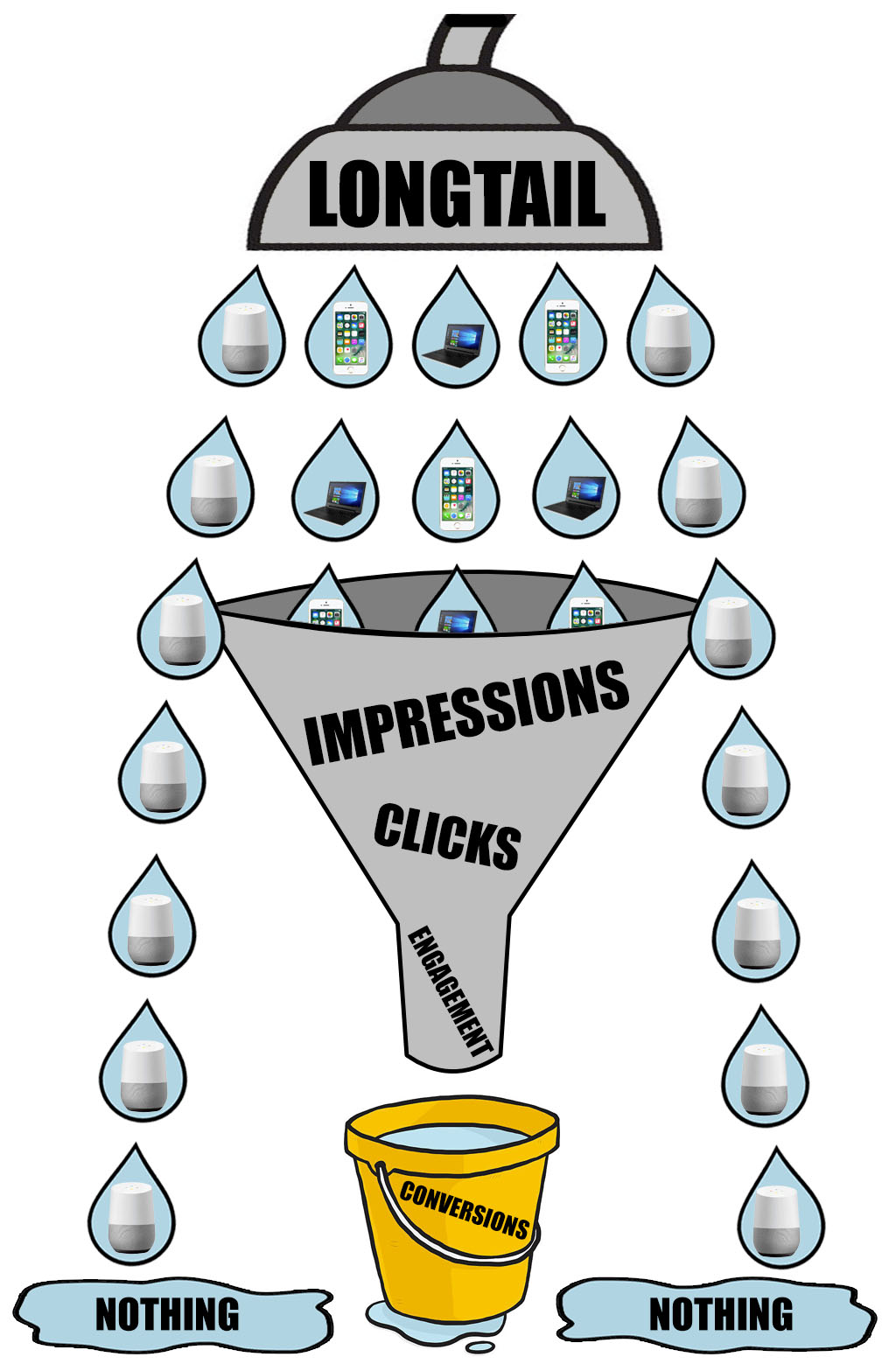
Still need more time to see how this all plays out. Voice search is still too new. It *could* be that, having searched by voice, users are more likely (though the Big G personalising their results, brand awareness or something else) to come back to a site.
It could be that, that extra brand awareness plays out in other searches on other devices going up e.g. once I saw that your site is *the* authority on Colchester United (truly the greatest team in Anglia) then, next time I want more info on Colchester I know where I’m going.
Stretching the analogy – but hope you get my point!
“Stretching the analogy” was certainly the case when you said ColU are the best team in EA – Everyone knows it’s Billericay!